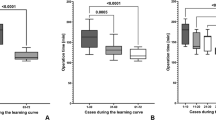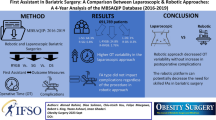Abstract
Introduction
The use of robotic-assisted (RA) surgery in the field of metabolic and bariatric surgery (MBS) is controversial because of cost concerns and issues related to efficiency. The objective of this study is to evaluate the operating room efficiency in performing RA-MBS prior and after the implementation of a standardized surgical approach.
Materials and Methods
All MBS cases entered into our database between October 2017 and October 2022 were collected and analyzed before and after the introduction of the standardized approach (SA). The outcome variables consisted of operation time (OT), turnover time (TT), wheels in-wheels out (WW), and console time (CT). Procedures were divided into Roux-en-Y gastric bypass (RYGB), sleeve gastrectomy (SG), and revisional bariatric surgery (RBS).
Results
For RYGB (n = 185), we found a significant reduction in OT, TT, and WW after SA (129 min vs 139 min; 37 min vs 73 min; 165 min vs 175 min, respectively, p < 0.05). For SG (n = 253), we found a significant reduction in turnover time (TT) after SA. For RBS (n = 201), we also found a significant reduction in OT, TT, WW, and CT after SA ( 157 min vs 177 min; 36 min vs 72 min; 194 min vs 216 min; 119 min vs 134 min, respectively, p < 0.05).
Conclusion
Using a standardized surgical approach, we were able to demonstrate improved operation room efficiency as demonstrated by a reduction in operation length, turnover time, and the overall time of the procedure for primary RYGB and revisional procedures and turnover time for primary sleeve procedures.
Graphical Abstract












Similar content being viewed by others
References
Evans M, Anupindi VR, DeKoven M, et al. Eight-year trends in obesity-related complications and health care cost progression in a US population with obesity: a retrospective cohort study. Diabetes Obes Metabolism. 2023;25:536–44.
Ribaric G, Buchwald JN, McGlennon TW. Diabetes and weight in comparative studies of bariatric surgery vs conventional medical therapy: a systematic review and meta-analysis. Obes Surg. 2014;24:437–55.
English WJ, DeMaria EJ, Hutter MM, et al. American Society for Metabolic and Bariatric Surgery 2018 estimate of metabolic and bariatric procedures performed in the United States. Surg Obes Relat Dis. 2020;16:457–63.
Telem DA, Talamini M, Altieri M, et al. The effect of national hospital accreditation in bariatric surgery on perioperative outcomes and long-term mortality. Surg Obes Relat Dis. 2015;11:749–57.
Bauerle WB, Mody P, Estep A, et al. Current trends in the utilization of a robotic approach in the field of bariatric surgery. Obes Surg. 2023;33:482–91.
Villamere J, Gebhart A, Vu S, et al. Utilization and outcome of laparoscopic versus robotic general and bariatric surgical procedures at Academic Medical Centers. Surg Endosc. 2015;29:1729–36.
Chaar ME, Stoltzfus J, Melitics M, et al. 30-day outcomes of revisional bariatric stapling procedures: first report based on MBSAQIP Data Registry. Obes Surg. 2018;28:2233–40.
Lundberg PW, Stoltzfus J, Chaar ME. 30-day outcomes of robot-assisted versus conventional laparoscopic sleeve gastrectomy: first analysis based on MBSAQIP. Surg Obes Relat Dis. 2019;15:1–7.
Papasavas P, Chaar ME, Kothari SN. Committee on behalf of the AS for M and BSCI. American Society for Metabolic and Bariatric Surgery position statement on vagal blocking therapy for obesity. Surg Obes Relat Dis. 2016;12:460–1.
Nasser H, Munie S, Kindel TL, et al. Comparative analysis of robotic versus laparoscopic revisional bariatric surgery: perioperative outcomes from the MBSAQIP database. Surg Obes Relat Dis. 2020;16:397–405.
Wehrtmann FS, de la Garza JR, Kowalewski KF, et al. Learning curves of laparoscopic Roux-en-Y gastric bypass and sleeve gastrectomy in bariatric surgery: a systematic review and introduction of a standardization. Obes Surg. 2020;30:640–56.
Petrick AT, Rosenthal R, Wood C. Understanding the causes of conflicting outcomes reported using the same cohorts from the MBASQIP PUF data registry. Surg Obes Relat Dis. 2021;17:e42–5.
Chaar ME, Petrick A, Clapp B, et al. Outcomes of robotic-assisted bariatric surgery compared to standard laparoscopic approach using a standardized definition: first look at the 2020 Metabolic and Bariatric Surgery Accreditation Quality Improvement Project (MBSAQIP) data. Obes Surg. 2023;33:2025–39.
King K, Galvez A, Stoltzfus J, et al. Cost Analysis of Robotic Roux-en-Y gastric bypass in a single academic center: how expensive is expensive? Obes Surg. 2020;30:4860–6.
Chaar ME, Gacke J, Ringold S, et al. Cost analysis of robotic sleeve gastrectomy (R-SG) compared with laparoscopic sleeve gastrectomy (L-SG) in a single academic center: debunking a myth! Surg Obes Relat Dis. 2019;15:675–9.
Acevedo E, Mazzei M, Zhao H, et al. Outcomes in conventional laparoscopic versus robotic-assisted primary bariatric surgery: a retrospective, case–controlled study of the MBSAQIP database. Surg Endosc. 2020;34:1353–65.
Chaar ME, King K, Pastrana M, et al. Outcomes of robotic surgery in revisional bariatric cases: a propensity score-matched analysis of the MBSAQIP registry. J Robotic Surg. 2021;15:235–9.
Clapp B, Liggett E, Jones R, et al. Comparison of robotic revisional weight loss surgery and laparoscopic revisional weight loss surgery using the MBSAQIP database. Surg Obes Relat Dis. 2019;15:909–19.
Tatarian T, Yang J, Wang J, et al. Trends in the utilization and perioperative outcomes of primary robotic bariatric surgery from 2015 to 2018: a study of 46,764 patients from the MBSAQIP data registry. Surg Endosc. 2021;35:3915–22.
Pastrana M, Stoltzfus J, AlMandini A, et al. Evolution of outcomes of robotic bariatric surgery: first report based on MBSAQIP database. Surg Obes Relat Dis. 2020;16:916–22.
Dudash M, Kuhn J, Dove J, et al. The longitudinal efficiency of robotic surgery: an MBSAQIP propensity matched 4-year comparison of robotic and laparoscopic bariatric surgery. Obes Surg. 2020;30:3706–13.
Kannan U, Ecker BL, Choudhury R, et al. Laparoscopic hand-assisted versus robotic-assisted laparoscopic sleeve gastrectomy: experience of 103 consecutive cases. Surg Obes Relat Dis. 2016;12:94–9.
Ecker BL, Maduka R, Ramdon A, et al. Resident education in robotic-assisted vertical sleeve gastrectomy: outcomes and cost-analysis of 411 consecutive cases. Surg Obes Relat Dis. 2016;12:313–20.
Pernar LIM, Robertson FC, Tavakkoli A, et al. An appraisal of the learning curve in robotic general surgery. Surg Endosc. 2017;31:4583–96.
Jain M, Fry BT, Hess LW, et al. Barriers to efficiency in robotic surgery: the resident effect. J Surg Res. 2016;205:296–304.
Cofran L, Cohen T, Alfred M, et al. Barriers to safety and efficiency in robotic surgery docking. Surg Endosc. 2022;36:206–15.
Urrego H, Sanni A, Toro JP, et al. Out by 3:30—a study in robotic bariatric surgery efficiency. Bariatr Surg Pract P. 2014;9:55–60.
Feuer G, Hernandez P, Barker J. Surgical technique enhances the efficiency of robotic hysterectomy. Int J Medical Robotics Comput Assisted Surg. 2011;7:1–6.
Author information
Authors and Affiliations
Corresponding author
Ethics declarations
Consent to Participate
Informed consent does not apply.
Conflict of Interest
Dr. Maher El Chaar is a paid faculty for Intuitive surgical; none of the other authors have any disclosures.
Additional information
Publisher’s Note
Springer Nature remains neutral with regard to jurisdictional claims in published maps and institutional affiliations.
Key Points
1. The use of robotic-assisted (RA) surgery in the field of metabolic and bariatric surgery (MBS) is controversial because of cost concerns and issues related to efficiency.
2. The objective of this study is to evaluate the difference in operating room efficiency prior and after the implementation of our standardized approach.
3. Using a standardized surgical approach for all MBS at our institution, we were able to demonstrate improved operation room efficiency through a reduction in operation length, turnover time, and the overall time of the procedure.
4. Improvement in OR efficiency during the performance of robotic-assisted surgery in the field of MBS can potentially decrease healthcare costs and increase adoption rate.
Rights and permissions
Springer Nature or its licensor (e.g. a society or other partner) holds exclusive rights to this article under a publishing agreement with the author(s) or other rightsholder(s); author self-archiving of the accepted manuscript version of this article is solely governed by the terms of such publishing agreement and applicable law.
About this article
Cite this article
El Chaar, M., Michaud, A., Stoltzfus, J. et al. Improving Operating Room Efficiency of Robotic-Assisted Metabolic and Bariatric Surgery Through Standardization. OBES SURG 33, 3411–3421 (2023). https://doi.org/10.1007/s11695-023-06850-6
Received:
Revised:
Accepted:
Published:
Issue Date:
DOI: https://doi.org/10.1007/s11695-023-06850-6




